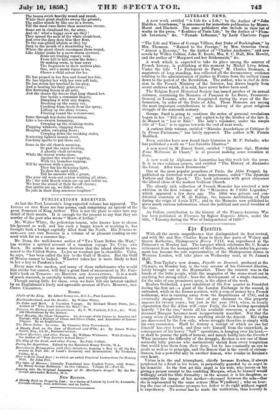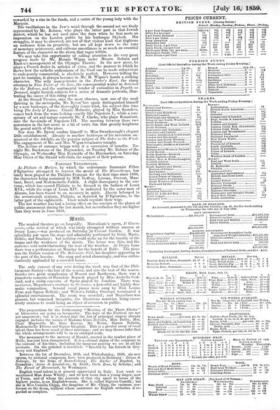g4r ffi4rstrrs.
With all the scenic magnificence that distinguished its first revival, and with Mr. and Mrs. Charles Kean in their fine parts of Wolsey and Queen Katherine, Shakspeare's Henry VIII. was reproduced at the Princess's on Monday last. The banquet which celebrates Mr. C. Kean's retirement from the management of this theatre, which under his govern- ment has become the sole representative of the Shakspearian drama in Western London, will take place on Wednesday next, at St. James's Hall.
Mr. Tom Taylor's new drama, Payable on Demand, produced at the Olympic, on Monday last, is the very reverse of his Contested Election, lately brought out at the Haymarket. There the interest was in the hands of the little people, while the magnates of the scene stood out in anything but strong relief ; here the development of a single character, for the sake of one prominent actor, is the object of the work. Reuben Goldsehid, a poor inhabitant of the Jew quarter in Frankfort during the first act—a giant of the London Exchange in the second, is entrusted, while in the former position, with a sum of money by a French nobleman, who is running away from the Republicans of 1792, and is eventually slaughtered. No trace of any claimant to this property appears for twenty years ; but just in the year 1814, when, in hourly expectation that the Allies will enter Paris, the Jew having speculated heavily "for the rise," needs all his available resources, a son of the deceased Marquis becomes most inopportunely manifest. Not that the young scion of nobility knows anything about the deposit. His rights are discovered by the Jew only, whose struggle therefore is simply with his own conscience. Shall he destroy a receipt of which no one but himself has ever heard, and thus save himself from the ruinwhich, in consequence of his heavy "bull " operations, is hanging over his head,— or shall he pursue the, path of honour, and march boldly into the.Gazette? What increases the difficulty of the struggle, Reuben ni not one of those naturally lofty persons who instinctively shrink from every temptation that would bear them from their duty, but he has constantly an eye to profit as well as to principle, and the demon that is the result of circum- stances, has a powerful ally in another demon, who resides in Reuben's own heart.
Virtue is in the end triumphant, chiefly because Reuben, if always
perplexed by a fiend in his heart, is perpetually guarded by an angel in his domicile. In the first act this angel is his wife, who insists on his
giving a proper receipt to the confiding Marquis, when he himself would willingly avoid the little formality ; in the second, it is his daughter, so completely the image of her mother—deceased between the acts--that
she is represented by the same actress (Miss Wyndham) ; who on hear- ing the case of conscience prompts her father to do right without regard to expediency. No sooner has he made the restitution, than honesty is
rewarded by a rise in the funds, and a union of the young lady with the Marquis. The vacillations in the Jew's mind through the second act are finely represented by Mr. Robson, who plays the latter part in that Jewish dialect, which he has not used since the days when he first made an impression on the London public by his burlesque Shylock. Ilia struggles, it may be observed, are not of that violent Bindthat frightens an audience from its propriety, but are all kept down to the tone of monetary aristocracy, and extreme smoothness is as much an essential feature of the character as the storm that rages within.
We may take this opportunity of calling attention to the very great progress made by Mr. Horace Wigan under Messrs. Robson and Emden's management of the Olympic Theatre. In the new piece, he plays a French dealer in articles of virtu, and the manner in which he shows how the catholic enthusiasm of the Gaul can be made subservient to ends purely commercial, is absolutely perfect. However trifling the part he sustains, it always becomes in Mr. H. Wigan's hands a striking character. The wily money-lender in the Porter's Knot, the sharp attorney in Nine Points of the Law, the consequential waiter in Retained for the Defence, and the sentimental vender of curiosities in _Payable on Demand, might furnish subjects for a series of dramatic portraits, illus- trating the career of this rising actor.
At the Strand Theatre, once the most obscure, now one of the most thriving in the metropolis, Mr. Byron: has again distinguished himself by a new burlesque, of the thoroughly comic kind, his subject this time being The Lady of Lyons. Claude Melnotte, played by Miss Saunders, comes back from the wars looking exactly like Napoleon I., while a con- spiracy of art and nature converts Mr. J. Clarke, who plays Beauseant, into the fac-simile of Napoleon III. The meeting between these two potentates in the last scene is a bit of extra fun that greatly heightens the genial mirth of the piece.
Nor does Mr. Byron confine himself to Miss Swanborough's elegant little establishment. Already is another burlesque of his invention an- flounced at the Adelphi, on the popular subject of The Babes in the Wood. The engagement of Mr. and Mrs. Wigan terminates tonight. The decline of summer brings with it a succession of benefits. To- night Mr. Buckstone of the Haymarket, on Tuesday Mr. Robson of the Olympic, on Wednesday Miss Reynolds of the Haymarket, on Saturday Miss Oliver of the Strand will claim the support of their patrons.



























 Previous page
Previous page